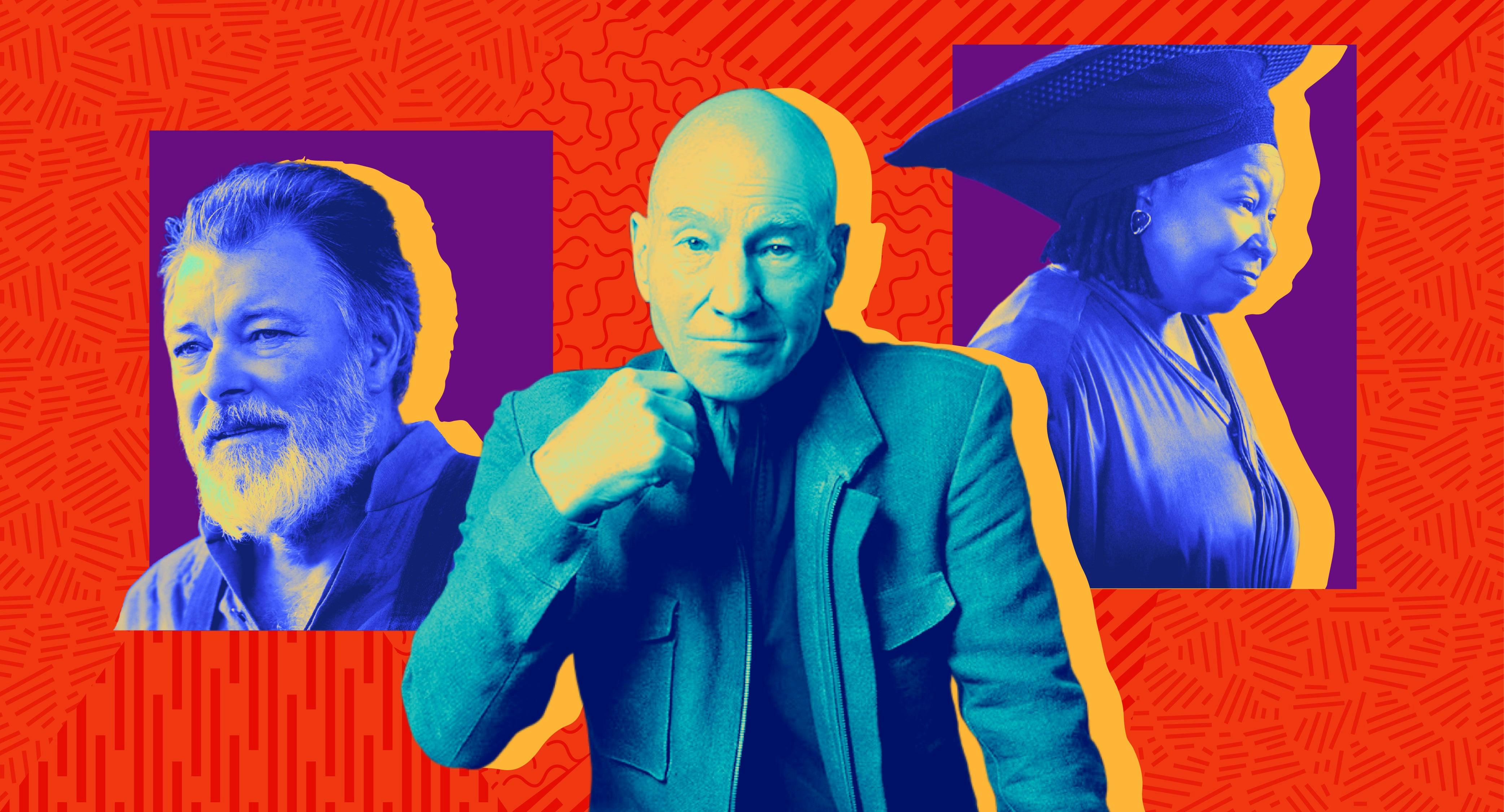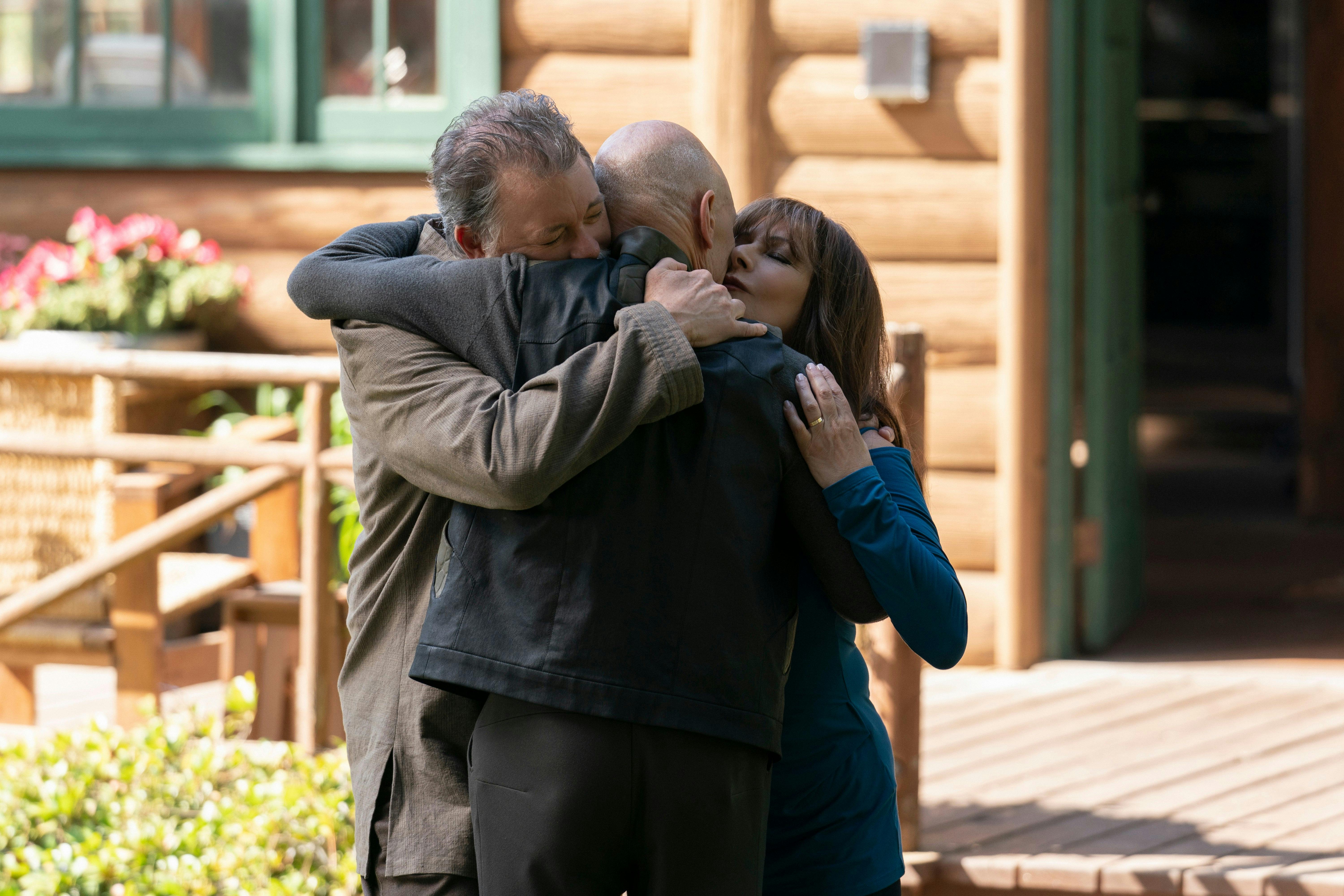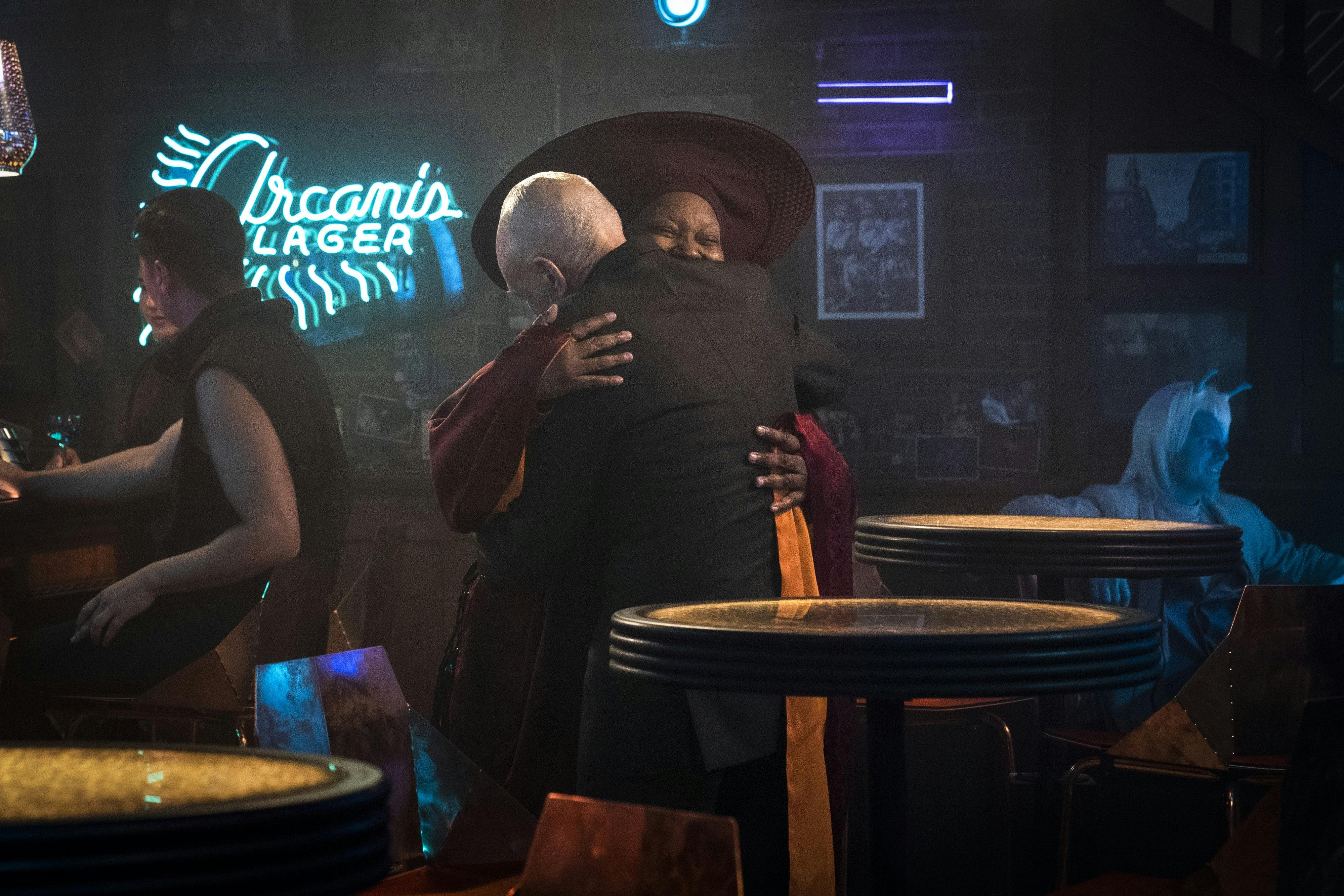Published Mar 24, 2022
Let Me Help
A famous phrase from TOS has strong connections to Star Trek: Picard

StarTrek.com
Like many fans, the first season of Star Trek: Picard affected me on a deeply personal level. I found the episode “Nepenthe” to be particularly poignant, as well as Riker's rescue mission in the first season finale. I still cannot watch either of those episodes without becoming overcome with emotion. In recent weeks, I reacted in a similar fashion to Guinan's appearance in the show’s season two premiere. I was not alone—I saw many posts on social media declaring fans’ tearful reactions to their reunion. I reflected a lot on why we felt that way, and I've concluded it's because of the pure expression of love.
In the 1967 Star Trek: The Original Series episode “The City on the Edge of Forever” James T. Kirk reveals to Edith Keeler that a century later a great novelist would recommend the words “Let me help” over “I love you.” Much like Guinan described her relationship to Jean-Luc as “beyond friendship, beyond family,” her and Riker’s encounters with him go beyond love — they reach out and they help Picard. In the aforementioned season one episodes and in season two thus far, Picard's situations are clearly dire and his dearest friends, his chosen family, step up to help as only they can. They don’t use the words “Let me help,” they simply live them.
As we enter year three of the pandemic, observe horrible anti-LGBTQIA2S+ laws being passed that will actively harm our most vulnerable, learn the shaky future of Western democracy, and witness unprovoked bombs being dropped on Ukraine, we have seen the continued and further splintering of our society. We're as far from Gene Roddenberry's vision as we've ever been. The attitude of "Let me help" has retreated to the shadows, overwhelmed by “You're on your own” and “I don't care.” For me, however, seeing Riker in season one and Guinan in season two immediately step in to help their beloved friend made me emotional precisely because it has seemingly become more and more rare in society, due to the deep political/ideological divides we face. This is tragic, but it doesn’t have to be permanent.

StarTrek.com
Having been on the receiving end of such acts of helping love many, many times, I have felt their significance. Consequently, “Let me help” has become a very personal ideology to me. There are, of course, people in my immediate circle for whom I will jump in to help as quickly as I can, particularly when I have the skills or insight that I know can be of aid. Those people are, in many cases, “beyond family” for me. But, admittedly, there are also those with whom I do not share an intimate relationship that pushes me to help and consequently, I am hesitant at times. Taking it a step further, as I look at the chaos of the world, I am not hesitant as much as I feel helpless.
Ironically, it is in those latter two scenarios where I believe the truest power of “Let me help” resides. Star Trek proclaims a better, hopeful future for humanity. The Federation of the future is expansive and inclusive, not isolationist and exclusive. It relies on communal support if not universal love. To reach Star Trek’s utopian future, each of us has to expand our perspective of where we can help, looking for opportunities to assist beyond our friends and beyond our families. It is internalizing the idea that, though it has become cliché in the last two years, we’re all in this together. Because we really are.
Now, I am not naïve to think this is simple. We can be, by nature, a selfish species. I also recognize my perspective comes from a place of great privilege. But perhaps that’s the very point. Because of my privilege, I am in a better place to say “Let me help.” I may not have a cure for covid, but I can help by wearing a mask to prevent exposure and transmission to the most vulnerable. I may not be able to vote in every state, but I can donate to organizations that will fight back against abusive, oppressive, and suppressive laws. I may not be called upon to take up arms and defend my homeland from invasion, but I can find ways online and offline to care for and support the millions of refugees that are fleeing for their lives. In these, and in hundreds of smaller, more personalized ways, each of us can help build a better Star Trek-like future.

StarTrek.com
In this conversation, it is important to mention self-care. Self-care is imperative. Sometimes, the most important person we must help is ourselves. As the world continued to shift, my 14-year-old son, who views life through a lens of great empathy, found himself falling into despair particularly for those suffering at the hands of evil leaders. He wanted so badly to help ease their pain, but was overcome by feelings of helplessness. As he recognized this in himself, however, he took a self-imposed break from social media, allowing himself to focus on his own mental and emotional healing. I’m proud of him, and I’m inspired by him. It was a reminder to me that we can’t help others if we’re not caring for ourselves first. Self-care doesn’t have to be some grand gesture. In fact, it’s probably not. It’s the little frequent things we do to recenter, refocus, and heal. Though it can be scary to say “Let me help” to the person in the mirror, we absolutely must.
Jean-Luc Picard has found people around him who are always ready to help him in whatever way he needs. Riker and Guinan, of course, are the obvious examples, but there’s another who has equally helped Picard on an intimate level, and will do so again in Star Trek: Picard season two: Q. Although ostensibly a recognized adversary in Jean-Luc’s life, Q has been an advocate and, in reality, a friend who helps Picard along his way. Q has expanded his friend’s mind, defended him to the Q Continuum, and continued to teach him the lessons from “the road not taken.”
Ultimately, the most important thing Q gives Jean-Luc is the understanding of the principle that “The trial never ends.” There is nothing truer in our lives than that. As the pandemic moves to its endemic stage; as evil leaders inflict their harmful will on others; as sexism, racism, ageism, and ableism run rampant, we as the human family will still have challenges that beset us. These ongoing challenges, these ongoing trials, will require each of us to look for opportunities to say, “Let me help.”
A Timeline Through the Star Trek Universe
Jake Black (he/him) is a writer whose credits include Star Trek: Starfleet Logbook, Star Trek Magazine, several sets of Star Trek trading cards, and works for DC Comics, Marvel, WWE, and many more. A twelve-year cancer survivor, he lives in a quiet Connecticut town with his wife, son, and twin daughters. He can be found online @jakeboyslim.
Star Trek: Picard streams exclusively on Paramount+ in the U.S. and is distributed concurrently by Paramount Global Distribution Group on Amazon Prime Video in more than 200 countries and territories. In Canada, it airs on Bell Media’s CTV Sci-Fi Channel and streams on Crave.
